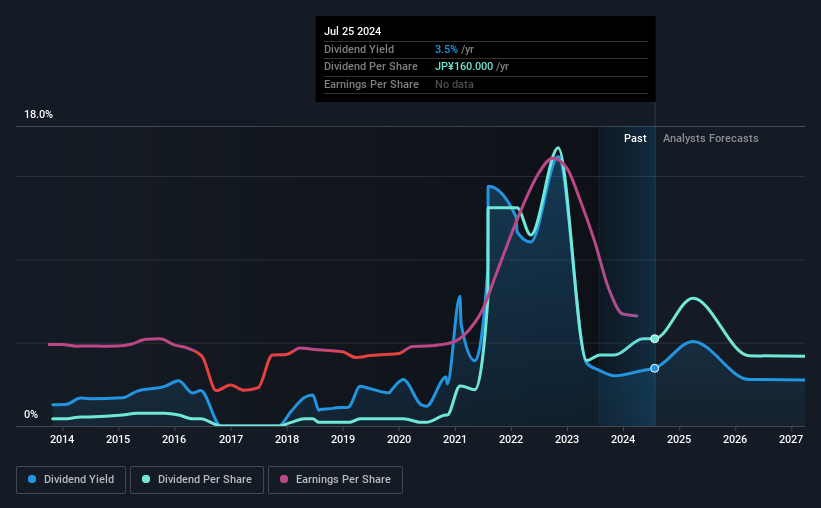- Japan
- /
- Marine and Shipping
- /
- TSE:9101
Nippon Yusen Kabushiki Kaisha's (TSE:9101) Dividend Will Be ¥80.00

Nippon Yusen Kabushiki Kaisha (TSE:9101) has announced that it will pay a dividend of ¥80.00 per share on the 2nd of December. The payment will take the dividend yield to 3.5%, which is in line with the average for the industry.
Check out our latest analysis for Nippon Yusen Kabushiki Kaisha
Nippon Yusen Kabushiki Kaisha's Dividend Is Well Covered By Earnings
Solid dividend yields are great, but they only really help us if the payment is sustainable. Prior to this announcement, Nippon Yusen Kabushiki Kaisha's dividend was only 30% of earnings, however it was paying out 112% of free cash flows. While the business may be attempting to set a balanced dividend policy, a cash payout ratio this high might expose the dividend to being cut if the business ran into some challenges.
Looking forward, earnings per share is forecast to fall by 9.0% over the next year. If the dividend continues along the path it has been on recently, we estimate the payout ratio could be 46%, which is comfortable for the company to continue in the future.

Dividend Volatility
Although the company has a long dividend history, it has been cut at least once in the last 10 years. Since 2014, the annual payment back then was ¥13.33, compared to the most recent full-year payment of ¥160.00. This means that it has been growing its distributions at 28% per annum over that time. Despite the rapid growth in the dividend over the past number of years, we have seen the payments go down the past as well, so that makes us cautious.
The Dividend Looks Likely To Grow
Growing earnings per share could be a mitigating factor when considering the past fluctuations in the dividend. We are encouraged to see that Nippon Yusen Kabushiki Kaisha has grown earnings per share at 43% per year over the past five years. Earnings per share is growing at a solid clip, and the payout ratio is low which we think is an ideal combination in a dividend stock as the company can quite easily raise the dividend in the future.
In Summary
In summary, while it's always good to see the dividend being raised, we don't think Nippon Yusen Kabushiki Kaisha's payments are rock solid. While the low payout ratio is a redeeming feature, this is offset by the minimal cash to cover the payments. This company is not in the top tier of income providing stocks.
It's important to note that companies having a consistent dividend policy will generate greater investor confidence than those having an erratic one. Meanwhile, despite the importance of dividend payments, they are not the only factors our readers should know when assessing a company. Just as an example, we've come across 5 warning signs for Nippon Yusen Kabushiki Kaisha you should be aware of, and 1 of them doesn't sit too well with us. Is Nippon Yusen Kabushiki Kaisha not quite the opportunity you were looking for? Why not check out our selection of top dividend stocks.
If you're looking to trade Nippon Yusen Kabushiki Kaisha, open an account with the lowest-cost platform trusted by professionals, Interactive Brokers.
With clients in over 200 countries and territories, and access to 160 markets, IBKR lets you trade stocks, options, futures, forex, bonds and funds from a single integrated account.
Enjoy no hidden fees, no account minimums, and FX conversion rates as low as 0.03%, far better than what most brokers offer.
Sponsored ContentValuation is complex, but we're here to simplify it.
Discover if Nippon Yusen Kabushiki Kaisha might be undervalued or overvalued with our detailed analysis, featuring fair value estimates, potential risks, dividends, insider trades, and its financial condition.
Access Free AnalysisHave feedback on this article? Concerned about the content? Get in touch with us directly. Alternatively, email editorial-team (at) simplywallst.com.
This article by Simply Wall St is general in nature. We provide commentary based on historical data and analyst forecasts only using an unbiased methodology and our articles are not intended to be financial advice. It does not constitute a recommendation to buy or sell any stock, and does not take account of your objectives, or your financial situation. We aim to bring you long-term focused analysis driven by fundamental data. Note that our analysis may not factor in the latest price-sensitive company announcements or qualitative material. Simply Wall St has no position in any stocks mentioned.
Have feedback on this article? Concerned about the content? Get in touch with us directly. Alternatively, email editorial-team@simplywallst.com
About TSE:9101
Nippon Yusen Kabushiki Kaisha
Engages in the provision of various logistics services worldwide.
Solid track record with excellent balance sheet and pays a dividend.
Similar Companies
Market Insights
Community Narratives


